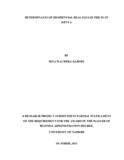| dc.contributor.author | Karoki, Rita Wachera | |
| dc.date.accessioned | 2013-11-13T09:18:51Z | |
| dc.date.available | 2013-11-13T09:18:51Z | |
| dc.date.issued | 2013-10 | |
| dc.identifier.citation | Degree Of Master of Business Administration (MBA) | en |
| dc.identifier.uri | http://erepository.uonbi.ac.ke:8080/xmlui/handle/123456789/58854 | |
| dc.description | A research project submitted in partial fulfillment
of the requirement for the award of the Master Of
Business Administration Degree,
University Of Nairobi | en |
| dc.description.abstract | The real estate market plays a very important role in any economy. It is known to have a
dramatic multiplier effect and is a key economic indicator. The real estate market has
experienced significant growth in the last decade w ith many countries experiencing house
price fluctuations. The Kenyan real estate market has been experiencing a boom in the past
ten years and the latest findings have shown that the trend will continue into the foreseeable
future. To ensure the economy is proper positioned a study into forces behind the price
fluctuations and hence the market growth is paramount. This study investigates the
determinants of residential real estate prices. Monthly secondary data for a period of eight
years spanning from 2005 to 2012 was collected from publications in government and
financial institutions. Descriptive as well as multiple regressions were run using SPSS
version 21.0. A multivariate regression model showing the relationship between residential
real estate prices and various variables was tested. The results show that that there are
significant negative relationship between residential real estate prices and interest rates, and
positive relationships with GDP, and level of money supply. Interest rates have the most
significant effect on house prices followed by GDP and level of money supply. Thus the
rise in property prices is well explained by macroeconomic variables. Although the study
established a positive relationship between residential real estate prices and inflation rates,
the relationship was found to be insignificant. The trend also indicates an overall increase
in property prices with time hence the real estate market in Kenya is expected to continue
to grow. Even without significant changes in the variables, the effect of time is that house
prices increase. This also indicates that the real estate market is significantly stable. | en |
| dc.language.iso | en | en |
| dc.publisher | University of Nairobi | en |
| dc.title | Determinants of residential real estate prices in Kenya | en |
| dc.type | Thesis | en |
| local.publisher | School of Business | en |

